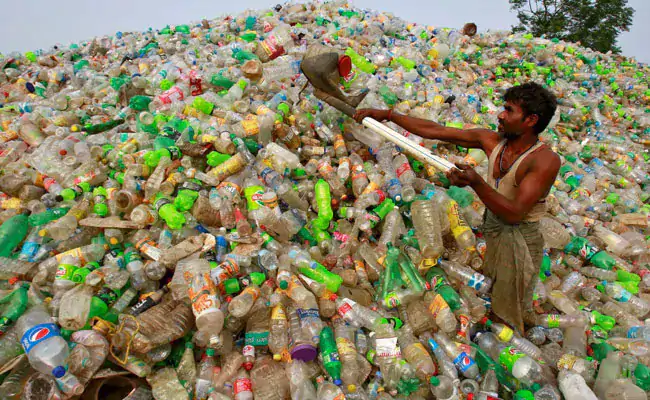This year’s focus for World Environment Day revolves around finding global solutions to combat plastic pollution and transition to a circular plastics economy. Plastics are valuable materials and play a vital role in various critical applications. However, managing plastic waste has become an immense challenge due to its widespread use and limited awareness of waste management options. According to OECD data, only approximately 9% of plastic is recycled globally, with nearly half of it ending up in landfills. This presents a significant opportunity to develop improved systems for the collection and management of plastic waste.
Plastic waste has gained significant attention in 2022. Heads of State, Environment Ministers, and other representatives from UN Member States endorsed a historic resolution at the UN Environment Assembly (UNEA-5) in Nairobi, aiming to end plastic pollution and establish an international legally binding agreement by 2024. The resolution addresses the entire life cycle of plastic, including production, design, and disposal. Notably, India has actively participated in the Intergovernmental Negotiating Committee meetings held in Uruguay and Paris.
In India, efforts to address plastic waste began with the government’s ban on single-use plastics in 2019, and the Ministry of Environment, Forest and Climate Change has identified 18 plastic articles for regulation. The Swachch Bharat Mission (SBM), launched in October 2014, focuses on scientifically managing 100% of solid waste. The progress of SBM is closely monitored, measured, and made public. The launch of SBM 2.0 in 2021 emphasizes plastic waste management, aiming to minimize single-use plastics, promote recycling and reuse through processing. This aligns with the Lifestyle for Environment (LiFE) Mission announced at COP 26, which emphasizes individual actions that can contribute to national-level change, encouraging individuals to become environmentally conscious.
The key challenges in India regarding plastic waste management are littering, source segregation, and inadequate infrastructure for subsequent waste management. Given India’s vast geographic spread and diverse cultures, traditions, and socio-economic factors, driving behavioral change is a challenging task. This is particularly true for plastic waste, as motivating habit changes and instilling source segregation practices are difficult. However, these challenges also present an opportunity to create livelihoods and develop a robust waste management sector.
Policy drivers like the Extended Producer Responsibility (EPR) Guidelines for plastic packaging in the Plastic Waste Management (PWM) Rules have facilitated on-ground action and gradually shifted the focus towards circular plastic packaging. These policies encourage investment in high-quality recycling. The government is implementing EPR for various materials beyond plastics, including tires, batteries, and waste oil.
Voluntary business initiatives such as the India Plastics Pact, hosted by the Confederation of Indian Industry (CII) and launched in 2021, complement policy enablement and strengthen efforts. With around fifty signatories, the pact provides a platform for stakeholders across the plastics packaging value chain to collaborate and take action. Signatories of the pact go beyond the government’s list of regulations and commit to removing 390 million unnecessary and problematic items from their packaging.
CII acknowledges the significant opportunities available to businesses and expresses optimism that regulations will drive investment in recycling capacity for different polymer resins. This, in turn, will lead to infrastructure development, including equipment, material recovery facilities, transportation, and technological advancements for sorting, processing, and recycling waste. Closed-loop recycling is crucial to maintain the highest material value in a circular economy.
The shift to sustainable practices poses challenges and opportunities for India’s medium, small, and micro enterprises. It requires capital, workforce, technology, skills, and capacity adjustments. CII works with this sector to minimize gaps and provide support through design guidance and information accessibility, facilitating the adoption of best practices.
Flexible packaging is prevalent in countries with socio-economic profiles similar to India. These countries also face challenges in collecting, storing, and recycling such packaging, despite its versatility. However, flexible packaging allows for the sale of popular food and non-food products at affordable prices, making it accessible to citizens across the country.
In 2018, India consumed 5.4 million metric tons (MMT) of plastics, with packaging accounting for 59% of the total weight. Among packaging materials, flexible packaging constituted 71% of the weight. This situation presents a significant opportunity for India to become a solution provider by incentivizing the collection and designing recyclable flexible packaging.
Overall, Indian businesses are now more knowledgeable and inclined to address environmental and sustainability issues than ever before. Reporting requirements like the Business Responsibility and Sustainability Reporting (BRSR) are driving transparency and accountability. Many businesses are actively engaged in research and development to develop improved and more circular plastic packaging. The government has established strong policies, and consistent implementation will build confidence among brands, recyclers, and manufacturers, leading to investments in better equipment and technology.
To address the challenge of plastic waste management, collaborative action is required from governments, industries, civil society, and NGOs. By working together, we can ensure that future generations inherit a greener earth. On this momentous occasion, let us pledge to continue our collective efforts towards a more sustainable future.



